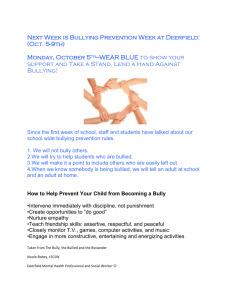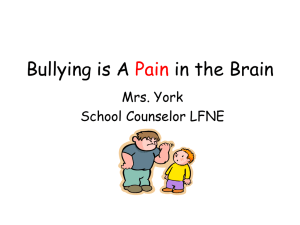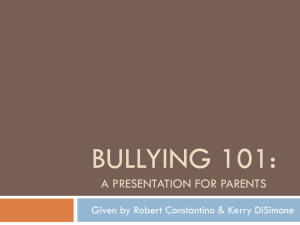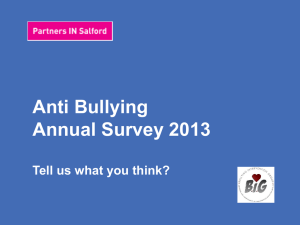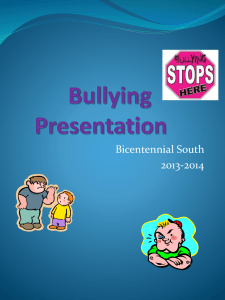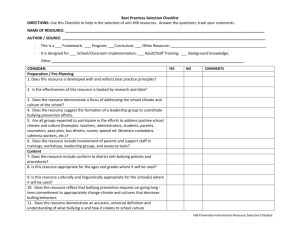14 Important Tips to Stop Bullying Now By Dr. Kathryn Seifert Bullies
advertisement
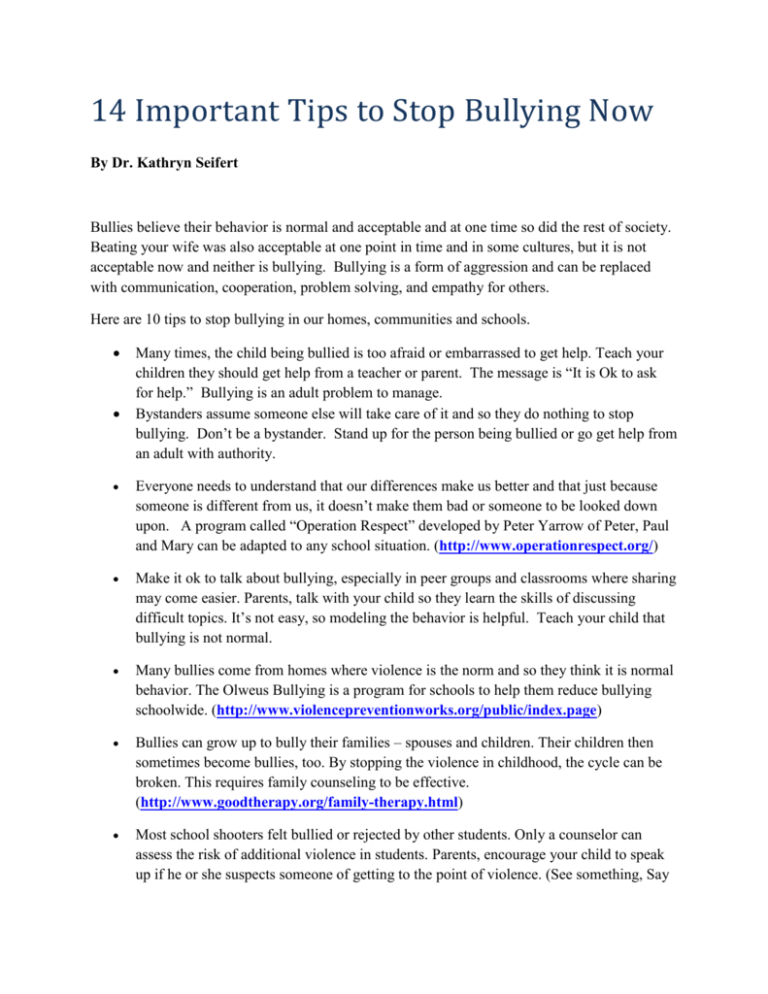
14 Important Tips to Stop Bullying Now By Dr. Kathryn Seifert Bullies believe their behavior is normal and acceptable and at one time so did the rest of society. Beating your wife was also acceptable at one point in time and in some cultures, but it is not acceptable now and neither is bullying. Bullying is a form of aggression and can be replaced with communication, cooperation, problem solving, and empathy for others. Here are 10 tips to stop bullying in our homes, communities and schools. Many times, the child being bullied is too afraid or embarrassed to get help. Teach your children they should get help from a teacher or parent. The message is “It is Ok to ask for help.” Bullying is an adult problem to manage. Bystanders assume someone else will take care of it and so they do nothing to stop bullying. Don’t be a bystander. Stand up for the person being bullied or go get help from an adult with authority. Everyone needs to understand that our differences make us better and that just because someone is different from us, it doesn’t make them bad or someone to be looked down upon. A program called “Operation Respect” developed by Peter Yarrow of Peter, Paul and Mary can be adapted to any school situation. (http://www.operationrespect.org/) Make it ok to talk about bullying, especially in peer groups and classrooms where sharing may come easier. Parents, talk with your child so they learn the skills of discussing difficult topics. It’s not easy, so modeling the behavior is helpful. Teach your child that bullying is not normal. Many bullies come from homes where violence is the norm and so they think it is normal behavior. The Olweus Bullying is a program for schools to help them reduce bullying schoolwide. (http://www.violencepreventionworks.org/public/index.page) Bullies can grow up to bully their families – spouses and children. Their children then sometimes become bullies, too. By stopping the violence in childhood, the cycle can be broken. This requires family counseling to be effective. (http://www.goodtherapy.org/family-therapy.html) Most school shooters felt bullied or rejected by other students. Only a counselor can assess the risk of additional violence in students. Parents, encourage your child to speak up if he or she suspects someone of getting to the point of violence. (See something, Say Something). Teachers, make sure that any bully or youth threatening violence has a complete violence risk assessment. Parents, discuss your children’s on-line behavior (including what he does with his cell phone). Periodically check out the things he’s posting for bullying clues. It’s good parenting to monitor this – it’s not an invasion of privacy. We must teach our children how to behave properly on-line, just like we taught them how to behave in public or how to treat others. Parents, if your child is being bullied, go to a school official. Insist that the problem be addressed without retaliation toward your child. Teaching your child to fight back may stop a bully from hurting your child in the short run, but they will continue to bully someone else. Teachers, if a child or parent reports bullying, take it seriously and take action. Bullying is not a stage of growing up unless the child is 2-3 years old in developmental terms. Refer the child to a therapist and insist on family therapy. Parents, keep an open dialog with your child so you can keep tabs on her attitude, friends, activities, etc. Talking takes a long time to work but it’s the most effective in the long term. So teach your children to keep asking for help until she feels safe. Remind your children of the serious outcomes of bullying such as victims taking their own lives and bullies facing legal charges. Allowing bullying to continue has serious consequences. Bullying often begins in early childhood in homes where there is abuse, neglect, and family violence. Support legislation for early day care with parent involvement and home visiting programs for all families referred to child protective services, and to Courts for domestic violence. School based mental health and addiction services places help in the schools where youth are every day. It has been proven to decrease bullying and aggression n schools. By teaching our children to face bullying and stop the cycle, we can reduce the tragedies and produce healthier kids.
